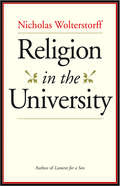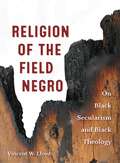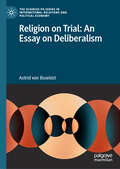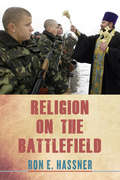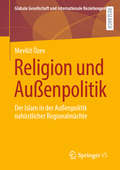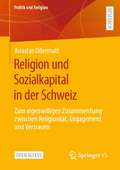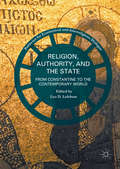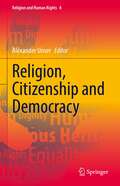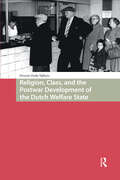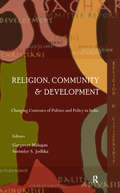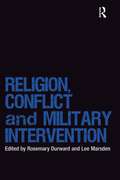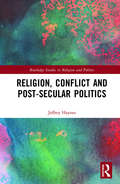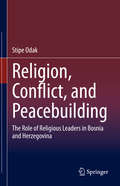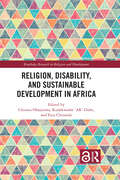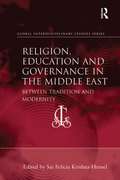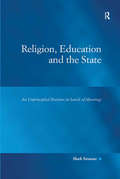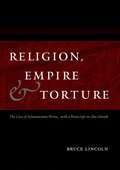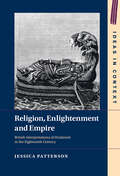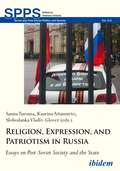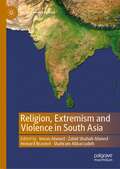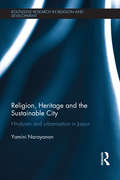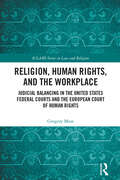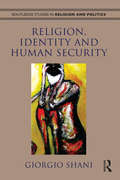- Table View
- List View
Religion in the Ranks
by Joanne Rennick Romeo DallaireWhat role does religion play in the Canadian Forces today? Examining the changing functions of the official religious leaders in the chaplaincy as well as the place and purpose of religion in the lives of regular military personnel, Religion in the Ranks explores this question in the context of late modernity and the Canadian secular state.In-depth interviews with chaplains and with personnel of differing spiritual beliefs offer insight into how religion affects the real life experiences of those who have endured difficult assignments, witnessed atrocities, and struggled to overcome post-traumatic stress disorder. While identifying the historic function of religion in the Canadian Forces, Joanne Benham Rennick demonstrates that spiritual interests remain important, even to those who do not consider themselves to be religious. Arguing that the leadership, practices, and beliefs rooted in religious affiliations create essential support systems for individuals, both at home and on assignment, Benham Rennick shows that there is still a place for religion in Canada's military.
Religion in the University
by Nicholas WolterstorffFrom one of the world’s leading philosophers, this is a powerful defense of religion’s role within the modern university What is religion’s place within the academy today? Are the perspectives of religious believers acceptable in an academic setting? In this lucid and penetrating essay, Nicholas Wolterstorff ranges from Max Weber and John Locke to Ludwig Wittgenstein and Charles Taylor to argue that religious orientations and voices do have a home in the modern university, and he offers a sketch of what that home should be like. He documents the remarkable changes have occurred within the academy over the past five decades with regard to how knowledge is understood. During the same period, profound philosophical advancements have also been made in our understanding of religious belief. These shifting ideals, taken together, have created an environment that is more pluralistic than secular. Tapping into larger debates on freedom of expression and intellectual diversity, Wolterstorff believes a scholarly ethic should guard us against becoming, in Weber’s words, “specialists without spirit and sensualists without heart.”
Religion of the Field Negro: On Black Secularism and Black Theology
by Vincent W. LloydBlack theology has lost its direction. To reclaim its original power and to advance racial justice struggles today black theology must fully embrace blackness and theology. But multiculturalism and religious pluralism have boxed in black theology, forcing it to speak in terms dictated by a power structure founded on white supremacy. In Religion of the Field Negro, Vincent W. Lloyd advances and develops black theology immodestly, privileging the perspective of African Americans and employing a distinctively theological analysis.As Lloyd argues, secularism is entangled with the disciplining impulses of modernity, with neoliberal economics, and with Western imperialism – but it also contaminates and castrates black theology. Inspired by critics of secularism in other fields, Religion of the Field Negro probes the subtle ways in which religion is excluded and managed in black culture. Using Barack Obama, Huey Newton, and Steve Biko as case studies, it shows how the criticism of secularism is the prerequisite of all criticism, and it shows how criticism and grassroots organizing must go hand in hand. But scholars of secularism too often ignore race, and scholars of race too often ignore secularism. Scholars of black theology too often ignore the theoretical insights of secular black studies scholars, and race theorists too often ignore the critical insights of religious thinkers. Religion of the Field Negro brings together vibrant scholarly conversations that have remained at a distance from each other until now. Weaving theological sources, critical theory, and cultural analysis, this book offers new answers to pressing questions about race and justice, love and hope, theorizing and organizing, and the role of whites in black struggle. The insights of James Cone are developed together with those of James Baldwin, Sylvia Wynter, and Achille Mbembe, all in the service of developing a political-theological vision that motivates us to challenge the racist paradigms of white supremacy.
Religion on Trial: An Essay on Deliberalism (The Sciences Po Series in International Relations and Political Economy)
by Astrid von BusekistThe book deals with three specific encounters between the law and religious commandments: &“separationism&”, &“composition&”, and &“cooperation&” (homeschooling, circumcision, the &“Get-laws&”), and how legal practitioners handle hard cases on a pragmatic basis. Its distinctiveness might me summarized as follows: The book is based on 3 empirical real-life scenarios (see Introduction) involving confrontations between religious commandments and secular law; conflicts between fundamental principles of different normative orders. Instead of asking how the liberal constitutionalism should normatively handle these cases (as the books and articles of my competitors listed below do), I suggest that the threshold between permissible / compatible religious practices is moving and should be treated contextually and pragmatically. My main claim is that there is not one single version of &“secularism&” (or &“laïcité&” in the French context), but a multiplicity of possible dialogues between representatives of faith communities and representatives of the legal / political community. My scenarios show that decisions are guided by a context-specific balance between democratic values, foremost equality and freedom. Sometimes these cardinal values conflict and judges must rank them. The articulation between religion and politics is not stable, not written in advance, not subsumable under a clear rule; legal principles are not hierarchically ordered a priori as all my cases show, even first-order principles (freedom/equality) must sometimes be weighed against each other. I try to theorize each of these pragmatic interactions under the umbrella-concept of &“deliberalism&” and show that my scenarios display three different types of interaction between orders that range from a strong separation to outright cooperation. The counterintuitive dimension of my book is to say that even in a very well-documented field, (Church and state-relations), secularism is not a thick concept, not a theory, but a practice.
Religion on the Battlefield
by Ron E. HassnerHow does religion shape the modern battlefield? Ron E. Hassner proposes that religion acts as a force multiplier, both enabling and constraining military operations. This is true not only for religiously radicalized fighters but also for professional soldiers. In the last century, religion has influenced modern militaries in the timing of attacks, the selection of targets for assault, the zeal with which units execute their mission, and the ability of individual soldiers to face the challenge of war. Religious ideas have not provided the reasons why conventional militaries fight, but religious practices have influenced their ability to do so effectively.In Religion on the Battlefield, Hassner focuses on the everyday practice of religion in a military context: the prayers, rituals, fasts, and feasts of the religious practitioners who make up the bulk of the adversaries in, bystanders to, and observers of armed conflicts. To show that religious practices have influenced battlefield decision making, Hassner draws most of his examples from major wars involving Western militaries. They include British soldiers in the trenches of World War I, U.S. pilots in World War II, and U.S. Marines in Iraq and Afghanistan. Hassner shows that even modern, rational, and bureaucratized military organizations have taken—and must take—religious practice into account in the conduct of war.
Religion und Außenpolitik: Der Islam in der Außenpolitik nahöstlicher Regionalmächte (Globale Gesellschaft und internationale Beziehungen)
by Mevlüt ÖzevWie beeinflusst Religion die internationale Politik? Diese Frage gewinnt zunehmend an Bedeutung, da vielerorts der Aufstieg religiöser Bewegungen und Parteien erkennbar ist. Mevlüt Özev untersucht dieses Phänomen anhand der machtpolitischen Rivalität zwischen dem Iran, Saudi-Arabien und der Türkei im Nahen Osten. Die nahöstlichen Regionalmächte nutzen den Islam als außenpolitisches Instrument und verfolgen dabei weitreichende Führungsambitionen. Der Autor zeigt, warum die Region anfällig für zwischenstaatliche Konflikte ist und wie ein Ausweg aus dieser Krise gefunden werden kann.
Religion und Sozialkapital in der Schweiz: Zum eigenwilligen Zusammenhang zwischen Religiosität, Engagement und Vertrauen (Politik und Religion)
by Anastas OdermattIn diesem Open-Access-Buch unterzieht Anastas Odermatt die weitverbreitete Annahme, dass sowohl Religion als auch freiwilliges Engagement förderlich für soziales Vertrauen und damit für gesellschaftlichen Zusammenhalt und Demokratie seien, einer empirischen Überprüfung. Wirkt Religion eher konflikthaft und negativ auf unsere Gesellschaft oder wirkt sie eher brückenbildend, stabilisierend und damit positiv? Diese Frage wird in Wissenschaft und Öffentlichkeit kontrovers diskutiert und unterschiedlich beantwortet. Basierend auf den Daten des KONID Survey 2019 für die Schweiz werden die Wirkmechanismen zwischen Religion und Religiosität, freiwilligem Engagement und sozialem Vertrauen in der Schweiz vertieft untersucht und allgemein verständlich erklärt. Dabei ergibt sich ein differenziertes Bild für die unterschiedlichen, teils eigenwilligen Zusammenhänge – neue Erkenntnisse und einige Überraschungen miteingeschlossen.
Religion without God
by Ronald DworkinIn his last book, Ronald Dworkin addresses questions that men and women have asked through the ages: What is religion and what is God's place in it? What is death and what is immortality? Based on the 2011 Einstein Lectures, Religion without God is inspired by remarks Einstein made that if religion consists of awe toward mysteries which "manifest themselves in the highest wisdom and the most radiant beauty, and which our dull faculties can comprehend only in the most primitive forms," then, he, Einstein, was a religious person. Dworkin joins Einstein's sense of cosmic mystery and beauty to the claim that value is objective, independent of mind, and immanent in the world. He rejects the metaphysics of naturalism--that nothing is real except what can be studied by the natural sciences. Belief in God is one manifestation of this deeper worldview, but not the only one. The conviction that God underwrites value presupposes a prior commitment to the independent reality of that value--a commitment that is available to nonbelievers as well. So theists share a commitment with some atheists that is more fundamental than what divides them. Freedom of religion should flow not from a respect for belief in God but from the right to ethical independence. Dworkin hoped that this short book would contribute to rational conversation and the softening of religious fear and hatred. Religion without God is the work of a humanist who recognized both the possibilities and limitations of humanity.
Religion, Authority, and the State
by Leo D. LefebureIn commemoration of Constantine's grant of freedom of religion to Christians, this wide-ranging volume examines the ambiguous legacy of this emperor in relation to the present world, discussing the perennial challenges of relations between religions and governments. The authors examine the new global ecumenical movement inspired by Pentecostals, the role of religion in the Irish Easter rebellion against the British, and the relation between religious freedom and government in the United States. Other essays debate the relation of Islam to the violence in Nigeria, the place of the family in church-state relations in the Philippines, the role of confessional identity in the political struggles in the Balkans, and the construction of Slavophile identity in nineteenth-century Russian Orthodox political theology. The volume also investigates the contrast between written constitutions and actual practice in the relations between governments and religions in Australia, Indonesia, and Egypt. The case studies and surveys illuminate both specific contexts and also widespread currents in religion-state relations across the world.
Religion, Citizenship and Democracy (Religion and Human Rights #8)
by Alexander UnserThis innovative volume is focused on the impact of religion on the realization of democratic citizenship. The researchers contributing provide empirical evidence on how religion influences attitudes towards citizenship and democracy in different countries. The book also tackles the challenges and opportunities for citizenship education. Experts contributing from sociology, political science, theology, and educational science look at the impact of religious beliefs and practices on democratic attitudes and behavior. Chapters also concern how religion influences the recognition of others as citizens. The text appeals to graduates and researchers in these fields with a secondary market for the general interest reader.
Religion, Class, and the Postwar Development of the Dutch Welfare State
by Dennie Oude NijhuisThis book examines how the Netherlands managed to create and maintain one of the world’s most generous and inclusive welfare systems despite having been dominated by Christian-democratic or conservative, rather than socialist dominated governments, for most of the post-war period. It emphasizes that such systems have strong consequences for the distribution of income and risk among different segments of society and argues that they could consequently only emerge in countries where middle class groups were unable to utilize their key electoral and strong labor market position to mobilize against the adverse consequences of redistribution for them. By illustrating their key role in the coming about of solidaristic welfare reform in the Netherlands, the book also offers a novel view of the roles of Christian-democracy and the labor union movement in the development of modern welfare states. By highlighting how welfare reform contributed to the employment miracle of the 1990s, the book sheds new light on how countries are able to combine high levels of welfare generosity and solidarity with successful macro-economic performance.
Religion, Community and Development: Changing Contours of Politics and Policy in India (Religion and Citizenship)
by Gurpreet Mahajan Surinder S. JodhkaBy making religious community a relevant category for discussing development deficit, the Sachar Committee Report (that was submitted to the Prime Minister of India in 2007) initiated a new political discourse in India. While the liberal secular framework privileged the individual over the community and was more inclined to use the category of class rather than the identity of religion, the Sachar Committee differentiated citizens on the basis of their religious identity. Its conclusions reinforced the necessity of approaching issues of development through the optic of religious community. This volume focuses on this shift in public policy. The articles in this collection examine the nature and implications of this new approach to the Indian social reality. Taking a close look at the findings of the Sachar Committee Report (SCR) they highlight the challenges posed by inter-community comparisons. At another level the articles supplement the debate initiated by the SCR by constructing a profile of religious communities in India so as to factor in their concerns of development into the present discourse and to nuance and modify the simple indicators to which development is often reduced. As most religious communities are themselves engaged in development-related activities the volume also examines some of these initiatives in order to see what development connotes to the members themselves and what receives attention by the community. Students of social sciences and development studies as well as those dealing with issues of marginalization will find this collection an invaluable resource for understanding contemporary India and for undertaking further theoretical and empirical research.
Religion, Conflict and Military Intervention (Religion and International Security)
by Rosemary DurwardFor many years religion has been the neglected component of international relations and yet in an age of globalization and terrorism, religious identity has become increasingly important in the lives of people in the West as well as the developing world. The secularization thesis has been overtaken by an increased desire to understand how religious actors contribute to both conflict and the resolution of conflict. This volume brings an exciting new perspective with fresh ideas and analyses of the events shaping conflict and conflict resolution today. The book uniquely combines chapters highlighting Christian and Islamist theological approaches to understanding and interpreting conflict, as well as case studies on the role of religion in US foreign policy and the Iraq war, with religious perspectives on building peace once conflicts are resolved. The volume provides an ideal starting point for anyone wishing to gain a deeper understanding of the religious character of conflict in the twenty-first century and how such conflict could be resolved.
Religion, Conflict and Post-Secular Politics (Routledge Studies in Religion and Politics)
by Jeffrey HaynesThis book identifies and examines the political activities of selected religious actors, in both domestic and international contexts, in relation to democracy, human rights and civilisational interactions. And it asks why, how and when do selected religious actors seek to influence political outcomes? The book is divided into two parts. Section 1 examines the controversial issue of how, why and when religious actors affect democratisation – that is, the transition to democracy – and democracy itself. These chapters examine the impact of religion on democratisation and human rights, with particular attention to secularisation, Islam, and globalisation. They indicate that numerous religious actors have had major importance in helping determine democratisation outcomes in various countries. Section 2 examines the relationships between religion, human rights and civilisational interactions in the context of post-secular politics and links to conflict, and it explores how these relationships affect political outcomes in both domestic and international contexts. This book will be of great interest to postgraduate and advanced undergraduate students of religion and politics; religion and international relations; democratisation and democracy; and global governance, especially studies of the United Nations. It will also interest practitioners and scholars who work on religion and politics, at a domestic and international level.
Religion, Conflict, and Peacebuilding: The Role of Religious Leaders in Bosnia and Herzegovina
by Stipe OdakThis book provides fresh insights into the role of religious leaders in conflict transformation and peacebuilding. Based on a large dataset of interviews with Christian and Muslim leaders in Bosnia and Herzegovina, it offers a contextually rich analysis of the main post-conflict challenges: forgiveness, reconciliation, and tragic memories. Designed as an inductive, qualitative research, it also develops an integrative theoretical model of religiously-inspired engagement in conflict transformation. The work introduces a number of new concepts which are relevant for both theory and practice of peacebuilding, such as Residue of Forgiveness, Degree Zero of Reconciliation, Ecumene of Compassion, and Phantomic Memories. The book, furthermore, proposes two correlated concepts – “theological dissonance” and “pastoral optimization” – as theoretical tools to describe the interplay between moral ideals and practical limitations. The text is a valuable resource for religious and social scholars alike, especially those interested in topics of peace, conflict, and justice. From the methodological standpoint, it is an original and audacious attempt at bringing together theological, philosophical, and political narratives on conflicts and peace through the innovative use of the Grounded Theory approach.
Religion, Disability, and Sustainable Development in Africa (Routledge Research in Religion and Development)
by Ezra Chitando Chioma Ohajunwa Kudakwashe ‘ak’ DubeThis book investigates the interplay between disability and religion in Africa, and what this means in the context of the Sustainable Development Goals.The importance of meeting the needs of people with disabilities is highlighted specifically in several Sustainable Development Goals, as well as being emphasised as a cross-cutting issue across all the goals. Over 1 billion people are estimated to be living with disabilities, and 80% of this population live in the Global South, many within Africa. This book argues that within this context, religion must be considered, as people with disabilities often turn to religion for solace in confronting the daily struggles and pains that they face. Drawing on multiple disciplinary lenses, this book reflects on how traditional/indigenous, Abrahamic, and other African minority religions and philosophies interact with disability, and how this relates to the Sustainable Development Goals. The book demonstrates how religions in Africa conceptualise, imagine, or re-imagine disability in the context of key themes such as gender, ecological justice, health, poverty, education, employment, entrepreneurship, and migration.Overall, the book invites researchers from across the social sciences to consider how African religious, theological, and philosophical ideas can help towards the inclusion of people with disabilities in the 2030 development agenda in Africa.
Religion, Education and Governance in the Middle East: Between Tradition and Modernity (Global Interdisciplinary Studies Series)
by Sai Felicia Krishna-HenselThe Middle East is a key geopolitical strategic region in the international system but its distinctive cultural and political divisions present a mosaic of states that do not lend themselves to simplistic interpretations. A thoughtful analysis of the Middle East requires an understanding of the synergism between tradition and modernity in the region as it adapts to a globalizing world. Religious education and activism continue to remain a significant factor in the modernization process and the development of modern governance in the states of the Middle East. This interdisciplinary book explores the historical and contemporary role of religious tradition and education on political elites and governing agencies in several major states as well as generally in the region. The relationship between democracy and authority is examined to provide a better understanding of the complexity underlying the emergence of new power configurations. As the region continues to respond to the forces of change in the international system it remains an important and intriguing area for analysts.
Religion, Education and the State: An Unprincipled Doctrine in Search of Moorings (Law, Justice And Power Ser.)
by Mark StrasserIn the context of education, Church and State issues are of growing importance and appear to be increasingly divisive. This volume critically examines the developing jurisprudence relating to religion in the schools beginning with Everson v. Board of Education, where the US Supreme Court discussed the wall of separation between Church and State. The study traces both how the Court's views have evolved during this period and how, through recharacterizations of past opinions and the facts underlying them, the Court has appeared to interpret Establishment Clause guarantees in light of the past jurisprudence when in reality that jurisprudence has been turned on its head. The Court not only offers an unstable jurisprudence that is more likely to promote than avoid the problems that the Establishment Clause was designed to prevent, but approaches Establishment Clause issues in a way that decreases the likelihood that an acceptable compromise on these important issues can be reached. The study focuses on the situation in the US but the important issue of religion, education and the state has great relevance in many jurisdictions.
Religion, Empire, and Torture: The Case of Achaemenian Persia, with a Postscript on Abu Ghraib
by Bruce LincolnHow does religion stimulate and feed imperial ambitions and violence? Recently, this question has acquired new urgency, and in Religion, Empire, and Torture, Bruce Lincoln approaches the problem via a classic but little-studied case: Achaemenian Persia. Lincoln identifies three core components of an imperial theology that have transhistorical and contemporary relevance: dualistic ethics, a theory of divine election, and a sense of salvific mission. Beyond this, he asks, how did the Achaemenians understand their place in the cosmos and their moral status in relation to others? Why did they feel called to intervene in the struggle between good and evil? What was their sense of historic purpose, especially their desire to restore lost paradise? And how did this lead them to deal with enemies and critics as imperial power ran its course? Lincoln shows how these religious ideas shaped Achaemenian practice and brought the Persians unprecedented wealth, power, and territory, but also produced unmanageable contradictions, as in a large case of torture discussed in the book's final chapter. Close study of that episode brings Lincoln back to the present with a postscript that provides a searing and utterly novel perspective on the photographs from Abu Ghraib.
Religion, Enlightenment and Empire: British Interpretations of Hinduism in the Eighteenth Century (Ideas in Context)
by Jessica PattersonIn the second half of the eighteenth century, several British East India Company servants published accounts of what they deemed to be the original and ancient religion of India. Drawing on what are recognised today as the texts and traditions of Hinduism, these works fed into a booming enlightenment interest in Eastern philosophy. At the same time, the Company's aggressive conquest of Bengal was facing a crisis of legitimacy and many of the prominent political minds of the day were turning their attention to the question of empire. In this original study, Jessica Patterson situates these Company works on the 'Hindu religion' in the twin contexts of enlightenment and empire. In doing so, she uncovers the central role of heterodox religious approaches to Indian religions for enlightenment thought, East India Company policy, and contemporary ideas of empire.
Religion, Expression, and Patriotism in Russia: Essays on Post-Soviet Society and the State (Soviet and Post-Soviet Politics and Society #213)
by Sanna TuromaThe 2010s saw an introduction of legislative acts about religion, sexuality, and culture in Russia, which caused an uproar of protests. They politicized areas of life commonly perceived as private and expected to be free of the state's control. As a result, political activism and radical grassroots movements engaged many Russians in controversies about religion and culture and polarized popular opinion in the capitals and regions alike. This volume presents seven case studies that probe into the politics of religion and culture in today's Russia. The contributions highlight the diversity of Russia's religious communities and cultural practices by analyzing Hasidic Jewish identities, popular culture sponsored by the Orthodox Church, literary mobilization of the National Bolshevik Party, cinematic narratives of the Chechen wars, militarization of political Orthodoxy, and moral debates caused by opera as well as film productions. The authors draw on a variety of theoretical approaches and methodologies, including opinion surveys, ethnological fieldwork, narrative analysis, Foucault's conceptualization of biopower, catachrestic politics, and sociological theories of desecularization. The volume’s contributors are Sanna Turoma, Kaarina Aitamurto, Tomi Huttunen, Susan Ikonen, Boris Knorre, Irina Kotkina, Jussi Lassila, Andrey Makarychev, Elena Ostrovskaya, and Mikhail Suslov.
Religion, Extremism and Violence in South Asia (Politics of South Asia)
by Imran Ahmed Shahram Akbarzadeh Howard Brasted Zahid Shahab AhmedThis book sheds light on religiously motivated extremism and violence in South Asia, a phenomenon which ostensibly poses critical and unique challenges to the peace, security and governance not only of the region, but also of the world at large. The book is distinctive in-so-far as it reexamines conventional wisdom held about religious extremism in South Asia and departs from the literature which centres its analyses on Islamic militancy based on the questions and assumptions of the West’s ‘war on terror’. This volume also offers a comprehensive analysis of new extremist movements and how their emergence and success places existing theoretical frameworks in the study of religious extremism into question. It further examines topical issues including the study of social media and its impact on the evolution and operation of violent extremism. The book also analyses grassroots and innovative non-state initiatives aimed to counter extremist ideologies. Through case studies focusing on Bangladesh, India, Pakistan and Sri Lanka, this collection examines extremist materials, methods of political mobilisation and recruitment processes and maps the interconnected nature of sociological change with the ideological transformations of extremist movements.
Religion, Heritage and the Sustainable City: Hinduism and urbanisation in Jaipur (Routledge Research in Religion and Development)
by Yamini NarayananThe speed and scale of urbanisation in India is unprecedented almost anywhere in the world and has tremendous global implications. The religious influence on the urban experience has resonances for all aspects of urban sustainability in India and yet it remains a blind spot while articulating sustainable urban policy. This book explores the historical and on-going influence of religion on urban planning, design, space utilisation, urban identities and communities. It argues that the conceptual and empirical approaches to planning sustainable cities in India need to be developed out of analytical concepts that define local sense of place and identity. Examining how Hindu religious heritage, beliefs and religiously influenced planning practices have impacted on sustainable urbanisation development in Jaipur and Indian cities in general, the book identifies the challenges and opportunities that ritualistic and belief resources pose for sustainability. It focuses on three key aspects: spatial segregation and ghettoisation; gender-inclusive urban development; and the nexus between religion, nature and urban development. This cutting-edge book is one of the first case studies linking Hindu religion, heritage, urban development, women and the environment in a way that responds to the realities of Indian cities. It opens up discussion on the nexus of religion and development, drawing out insightful policy implications for the sustainable urban planning of many cities in India and elsewhere in South Asia and the developing world.
Religion, Human Rights, and the Workplace: Judicial Balancing in the United States Federal Courts and the European Court of Human Rights (ICLARS Series on Law and Religion)
by Gregory MoseReligious freedom is a fundamental and relatively uncontested right in both the United States and Europe. But other values like equality, justice, and the right to a private life are just as precious. Managing such conflicts has become a highly contested and politicized area of law and nowhere are such conflicts more evident – or more challenging – than those arising in the workplace. By comparing United States Federal Courts’ approach to free exercise in the workplace with that of the European Court of Human Rights, this book explores two very different methodologies for adjudicating rights conflicts. In examining methods and results, case by case, issue by issue and addressing each step of the analytical processes taken by judges, it becomes apparent that the United States has lost its way in the quest for equality and justice. It is argued here that while the European approach has its own flaws, its proportionality approach may offer vital lessons for United States practice. The book will make compelling reading for researchers, academics, and policy-makers working in the areas of law and religion, human rights law, constitutional law, and comparative law.
Religion, Identity and Human Security (Routledge Studies in Religion and Politics)
by Giorgio ShaniReligion, Identity and Human Security seeks to demonstrate that a major source of human insecurity comes from the failure of states around the world to recognize the increasing cultural diversity of their populations which has resulted from globalization. Shani begins by setting out the theoretical foundations, dealing with the transformative effects of globalization on identity, violence and security. The second part of the volume then draws on different cases of sites of human insecurity around the globe to develop these ideas, examining themes such as: securitization of religious symbols retreat from multiculturalism rise of exclusivist ethno-religious identities post- 9/11 state religion, colonization and the ‘racialization’ of migration Highlighting that religion can be a source of both human security and insecurity in a globalizing world, Shani offers a ‘critical’ human security paradigm that seeks to de-secularize the individual by recognizing the culturally contested and embedded nature of human identities. The work argues that religion serves an important role in re-embedding individuals deracinated from their communities by neo-liberal globalization and will be of interest to students of International Relations, Security Studies and Religion and Politics.

